Chalk Farm Coving Installation (NW1): The traditional way to soften the sharp lines between ceiling and wall surfaces is by the installation of coving and decorative mouldings. Trends change through the years and the use of coving in interior design is a prime example, one year it is in, the next it is out, yet homes in Chalk Farm continue to be adorned with this useful addition. However it is down to personal preference as to whether you have coving put up in your property or not. You have a simple choice to make, should you opt for sharp, contemporary lines or rounded, classic transitions?
What is Coving? - Coving is an architectural term, meaning a curved, concave material which is used to cover and soften the angles where walls meet ceilings within a building. You might be surprised to learn that coving can be made from several materials, the most common being PVC, plastic, timber, duropolymer, paper covered plaster, hardened polyurethane, high-density polystyrene, MDF and gyproc.
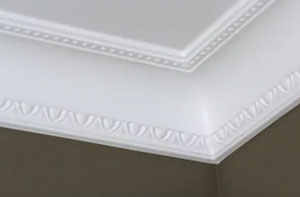
There are also a multitude of shapes and designs to choose from including dentil, ovolo, art deco, step, cyma reversa (or ogee), cavetto, Victorian, cyma recta, egg and dart and Edwardian.
The addition of coving to any room can subtly yet noticeably enhance the overall look and feel of the space. The shape of coving can help to create a seamless transition between ceilings and walls, giving your home a more refined appearance. But, with so many patterns and materials to choose from, selecting the right coving for your property can be overwhelming. When selecting coving, it's crucial to take into account your individual taste and the decor of your property. Achieving the best results with coving installation requires ensuring that the process is completed to the highest possible standard.
With so many decisions to be made, you may be thinking this process may get a bit challenging. If you turn to a professional Chalk Farm coving fitter, you'll get the best advice available for this kind of project. The advice and tips given here should help you to achieve a gorgeous coved finish for your property in Chalk Farm.
Any dependable Chalk Farm coving installation specialist will be just as happy doing coving repair and refurbishment work as they will be creating completely new interiors. Your mouldings and coving may need a bit of TLC from time to time, as they can get rather shabby. Repairs could be necessary on cornices, fire surrounds, dado rails, dado corners, wall plaques, coving, picture rails, ceiling roses, corbels or panel mouldings.
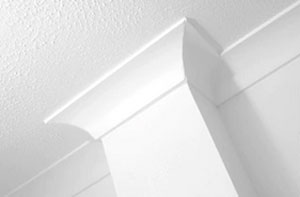
Coving work and the installation of ornate mouldings is often done by plasterers, joiners (where wood mouldings are involved), painters and decorators, and specialist coving installers in Chalk Farm, when available. Make certain they are experienced in work of this nature before you employ anyone. This is undoubtedly painstaking work and hiring somebody who will apply the required level of care and diligence is advisable.

When the quotes come in, it would be an error in judgment to automatically go for the cheapest coving installer, without considering all the available alternatives. Having to bring in somebody else, because your first (cheap) choice resulted in shoddy workmanship is something that you should avoid. You need to pick the best person for the job if you want the final effect of your coving to be outstanding.
There are various methods that you can use when you're on the lookout for plasterers or coving fitters in Chalk Farm, you could use a trade portal like Rated People or Trustatrader, you can look on Instagram or Facebook, you could have a look at local newspapers or directories or you can head off to the FMB website and use their search facility for certified local plasterers and coving installers. You're able to search for coving related products such as ceiling roses, coving corners, coving cutting tools, coving adhesive and coving packs by going to Wickes, Jewson, Coving Direct or B&Q, and you can buy equipment and tools for plastering and coving (if you fancy doing it on your own) by browsing the websites of Screwfix, Artex or Tool Station.
The Professional Installation of Coving
One's decision on DIY or professional coving installation relies chiefly on considerations of the budget, the intricacy of the undertaking and their skill level.
- Safety: Professionals, trained in safe practices, are crucial for coving installation as it often involves working at various heights and with heavy materials, helping to lessen the risk of accidents.
- Quality Assurance: In most cases, professional installation is accompanied by a quality guarantee. Experts tend to deliver a flawless finish, ensuring the coving is perfectly aligned and securely fixed, which is crucial for both an attractive appearance and the durability of the coving.
- Time Efficiency: The involvement of a professional can considerably cut down the time needed to complete the project, thanks to their access to suitable techniques and tools that streamline the process, particularly for more complicated or larger installations.
- Cost Implications: The principal disadvantage of opting for a professional coving installation is the associated cost. It's often much more expensive than a do-it-yourself approach, particularly when the coving material, like plaster, is inherently costly.
- Expertise and Precision: Professional installers bring a wealth of skill and experience to the table. They're adept at handling different types of coving materials, including plaster, which is heavy and requires a skilled hand for installation. Professionals ensure precise measurements and cuts, especially important when coving needs to fit into irregular spaces or when it involves elaborate designs.
Coving installation can be undertaken in Chalk Farm and also in: Camden Town, Belsize Park, Highbury, Dartmouth Park, Archway, Market Estate, Barnsbury Estate, Kilburn, Marylebone, Hilldrop Estate, Clerkenwell, St John's Wood, Bloomsbury, Kentish Town, Primrose Hill, Falconer Walk, and in these postcodes NW3 2BU, NW1 8RQ, NW3 2DF, NW1 8GW, NW1 8DB, NW3 2DQ, NW1 8EB, NW3 2DL, NW1 8DG, and NW1 8BN. Locally based Chalk Farm coving specialists will most likely have the telephone code 020 and the postcode NW1. Verifying this will guarantee you're accessing locally based coving fitters. Chalk Farm home and business owners will be able to benefit from these and countless other comparable services. To get coving installation price quotes, simply click the "Quote" banner.
Polyurethane Coving
Polyurethane, a durable and versatile synthetic polymer, is recognised for its lightweight nature. Polyurethane coving replicates the intricate designs of traditional plaster coving but offers a multitude of distinct advantages.
Benefits of Polyurethane Coving:
- Durability: A significant drawback of plaster coving is its tendency to become brittle and break over time. Polyurethane coving overcomes this weakness entirely. Its exceptional resistance to cracking, warping and chipping guarantees a long-lasting and beautiful addition to your property.
- Economical: The initial price of polyurethane coving per metre might raise some concerns when compared to basic plaster coving. However, the advantage lies in the lower risk of damage during fitting and ease of installation. This translates to considerable cost savings overall, making polyurethane a shrewd investment for your budget.
- Low Maintenance: The care for polyurethane coving is negligible, unlike plaster that can easily deteriorate; it just needs occasional wiping or dusting.
- Versatility: Polyurethane coving isn't just about functionality - it's about aesthetics too! From classic Victorian flourishes to sleek, minimalist profiles, the wide selection of styles available ensures you will find the ideal coving to seamlessly complement your existing décor.
- Light in Weight: One of the primary benefits of polyurethane coving is its considerably lighter weight when compared to plaster. This makes it a DIY-friendly option, because it's easier to install and handle, especially for those tackling home improvement projects themselves. Additionally, the lighter weight reduces the likelihood of damaging your ceilings and walls during the installation process.
- Moisture Resistance: Polyurethane is largely unaffected by moisture, making it great for use in kitchens and bathrooms, where levels of humidity can fluctuate.
- Ease of Installation: This kind of coving is a DIY dream! Simple tools and readily available adhesives are all that is needed for installation. While professional help is always advisable for complex projects and intricate designs, the ease of installation makes polyurethane coving a fantastic option for the handy homeowner.
- Pre-Primed: Save yourself time and effort! Most polyurethane coving comes pre-primed, eliminating the need for priming before painting. Simply choose your desired topcoat and achieve a faultless finish in no time at all.
Polyurethane coving presents an aesthetically attractive and functional option as opposed to conventional plaster coving. Its ease of installation, durability and wide range of styles make it a much favoured choice for property owners and interior designers alike. With careful planning and proper execution, polyurethane coving can add a touch of elegance and sophistication to any room in your Chalk Farm property.
Picture Rails
Picture rails are mouldings installed horizontally on walls, typically about 12 to 24 inches below the ceiling line. They were initially conceived for hanging pictures without causing damage to the walls with screws, hooks, or nails. Instead of drilling holes in the wall, you can use hooks that sit neatly on the rail, making it easy to move or change your artwork whenever you like.
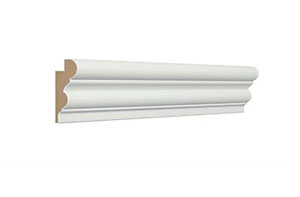
These rails, which were widely favoured in Edwardian and Victorian homes, enhanced rooms with both functionality and a stylish accent. You can find them in older properties in Chalk Farm, but many still opt to install them today due to their practical benefits and classic design. Picture rails add a touch of character to a room by creating a visual break on tall, featureless walls.
Installing a picture rail is a relatively simple DIY task if you have some basic handyman abilities. The process involves measuring, cutting the rail to the correct size, and fixing it to the wall, typically using nails or screws. When in position, the rail can be stained or painted to align with your interior decor, transforming it into a chic and functional feature for any home. If this sort of work is beyond your capabilities or you prefer not to do it, you will have to reach out to an Chalk Farm coving fitter. (Picture Rail Installation Chalk Farm)
Maintenance and Repair of Coving and Cornices
Maintaining and repairing cornices and coving is an essential aspect of keeping a property in good condition. Over time, the beauty of cornices and coving, which can add a touch of style to a room, can diminish due to cracks, damage or discolouration.
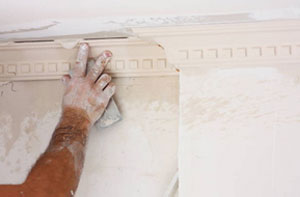
Frequent inspections and timely repair work can prevent additional damage by identifying and addressing problems early on. The repair process for cornices and coving can vary depending on the degree of damage, and can range from basic filling of cracks and smoothing rough spots to intricate replacement of sections. To ensure a flawless finish that matches the original design, it is important to repair coving and cornices using the correct materials and techniques.
Coving and cornices left unmaintained can lead to structural damage that jeopardises the building's integrity. Complex repairs or the restoration of historical cornices and coving may necessitate specialist services to complete. To prevent the buildup of grime and muck and preserve their original beauty, coving and cornices require not only repairs but also regular cleaning and dusting. Coving and cornices can enhance the beauty and worth of a property for a long time if they are repaired and well-maintained.
Plaster Coving Installation Chalk Farm
Plaster coving is a decorative moulding that gracefully adorns the junction between walls and ceilings, adding a touch of style and elegance to any room. These detailed and durable decorative mouldings are generally made from gypsum plaster, which is often reinforced with hessian or fibreglass. Available in various designs from simple curves to ornate patterns, it suits both classic and modern interiors in Chalk Farm. Many Chalk Farm householders choose plaster coving to hide imperfections and create a seamless transition between the wall and ceiling.
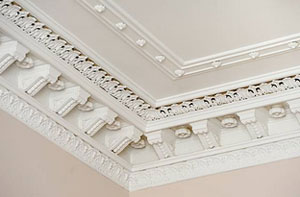
Despite its seemingly simple appearance, installing plaster coving requires considerable precision and skill to achieve a good result. By hiring a specialist, you make certain that the coving is cut precisely, with perfect mitred corners, and firmly secured in place. By using the right materials and tools, a professional coving installer ensures the adhesive is correctly applied and any gaps are smoothly filled, achieving a flawless appearance.
Selecting a professional to install your plaster coving ensures you save time and energy, resulting in a high-quality finish that enhances your home. Professionals can offer advice on the best type of coving to match your decor and ensure that the installation process is quick and efficient. Thanks to their skill and expertise, you can appreciate the added value and enduring elegance that well-installed plaster coving brings to your home in Chalk Farm. (Plaster Coving Chalk Farm)
Gyproc Coving Chalk Farm
Gyproc coving, a decorative feature, is used to improve the appearance of the junction between ceilings and walls in Chalk Farm. To suit different types of rooms, it comes in various styles and sizes and is made from plasterboard. Adding a hint of elegance to any space, installing Gyproc coving creates a seamless transition from ceiling to wall and hides any ugly cracks or imperfections.
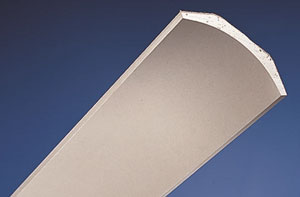
The procedure for installation is not that difficult. Cut to fit the dimensions of the room, the coving pieces are then fixed in position with a strong adhesive. For a neat finish, gaps and joints are filled and smoothed by sanding. For homeowners looking to improve their interiors' appearance without extensive refurbishments, Gyproc coving is an attainable DIY project.
There are also a range of practical benefits associated with Gyproc coving. At the wall-ceiling junction, it can help cover cracks that sometimes appear over time, offering a longer-lasting, cleaner look. Additionally, coving can be painted to either match or contrast with the room's decor, allowing for further customisation. To improve the beauty and functionality of a room, Gyproc coving is an effective and simple option. (Gyproc Coving Chalk Farm)
DIY Coving Installation
Adding a touch of sophistication to your home can be achieved through DIY coving installation, making it a gratifying task for those who prefer not to engage a professional. Accurate measurement of your walls is essential to ensure that the coving fits perfectly; thus, the process begins with careful measuring. Coving typically comes in sections that need to be cut at an angle, and using a mitre box with a fine-tooth saw will help achieve cleaner and more accurate cuts.

Ensure that the surfaces are clean and free of dust or debris before you start attaching the coving to the walls. Coving adhesive or any strong adhesive is ideal for fixing it, but remember to use a generous amount to ensure it holds firmly. Carefully press the coving into position, making any adjustments required, and wipe away the excess adhesive before it sets.
Filling any gaps and sealing the edges with a decorator's caulk or filler is the final step in the process. When dry, sanding off any rough spots will give you a smooth finish that's ready to be painted. Enhancing the look of your Chalk Farm home can be achieved through DIY coving installation, which also provides a satisfying endeavour for those keen on DIY improvements. (Tags: DIY Coving Chalk Farm)
Plaster Cornice Repair Chalk Farm
Plaster cornice restoration is an important aspect of maintaining the aesthetic appearance of a building's interior. Cornices, the ornamental molding found at the joint between walls and ceilings, are vulnerable to damage caused by wear and tear, moisture or accidental impact.
Repairing a plaster cornice requires the expertise of a skilled tradesperson who can carefully assess the extent of the damage and devise a suitable restoration plan. Cleaning the area, removing any loosened or damaged plaster, and filling in the gaps with new plaster is the usual repair process for a plaster cornice. Matching the original design of a cornice during repair requires the skill of tradespeople who can replicate intricate designs or patterns.
The safety and structural integrity of a property can be compromised if a damaged cornice is neglected and left unrepaired. Therefore, it's crucial to seek professional help for any plaster cornice repair work. Preservation of the historical integrity of a property, especially in heritage buildings where original features are crucial, is aided by a well-maintained cornice that enhances the building's visual appeal.
Is Coving a Messy Job?
Coving installation can be quite messy. It involves applying plaster or adhesive to the ceilings and walls, then fixing decorative moulding in place. This process generates debris, dust, and the potential for spills. Cutting and fitting the coving can also result in the production of waste materials. While professionals utilise dust sheets and protective measures to minimise mess, some level of cleanup is typically required afterward. DIYers in Chalk Farm may find it messier due to inexperience. Overall, while coving can provide an eye-catching finishing touch to a room, it does entail a degree of messiness that requires management.
What Tradesman Puts up Coving?
Craftspeople who specialise in installing coving typically fall into three categories: painters and decorators, plasterers and carpenters. Plasterers, with their expertise in decorative moldings, often take on coving installation, which involves shaping and attaching plaster or gypsum-based strips to the intersection of walls and ceilings, resulting in smooth, seamless finishes. Carpenters also handle coving installation, particularly when it's made of wood or MDF (medium-density fiberboard). They meticulously measure, cut, and fit wooden coving pieces to create elegant and intricate designs. Both carpenters and plasterers make sure that coving not only enhances the room's aesthetic appeal but also conceals imperfections in wall-ceiling junctions, lending a polished and cohesive look to interior spaces. Painters and decorators may also handle coving installation, especially when it's made from polyurethane, duropolymer or polystyrene.
Wooden Coving Chalk Farm
Transform your space with the timeless appeal of wooden coving. Installed at the intersection of wall and ceiling, it offers a touch of decorative charm. This coving is produced in a multitude of finishes and styles, from classic to contemporary, to complement various tastes and interior design schemes. The aesthetic appearance of your property is improved by coving, which also masks any imperfections or ugly joints where the wall and ceiling join.
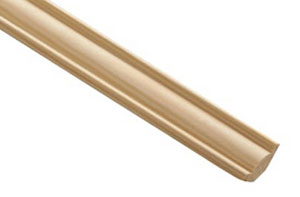
Ensuring a seamless and professional finish with wooden coving installation demands skill and precision. The procedure includes accurately measuring the room, cutting lengths of coving to the correct dimensions, and securing it firmly in position with adhesive and nails. You may also need to carefully sand and paint or stain the coving to ensure it blends with your existing design scheme. Despite some DIYers potentially tackling this task alone, securing professional installers assures a flawless and long-lasting finish.
Avoid the hassle of fitting timber coving with professional installation services. The job is accomplished proficiently and to a high standard of workmanship, thanks to the knowledge and tools brought by skilled installers. From the initial consultation and measurements to the final details, they manage everything, ensuring your home is enhanced with beautifully finished coving. Expert installation is a worthwhile investment as it saves time and ensures that the coving is both durable and visually attractive. (Wooden Coving Chalk Farm).
Archways and Alcoves Chalk Farm
Ageless elements that can transform a space from mundane to remarkable, bespoke alcoves and archways have long been celebrated in the world of interior design and architecture. Not only are such architectural features aesthetically pleasing, but they also serve functional purposes, such as defining areas within a room, providing storage solutions, or simply adding a bit of charm and elegance. Bespoke alcoves and archways, let's explore their world and discover why they continue to be cherished elements in interior design.

Bespoke Archways: Archways are architectural wonders that have graced buildings for hundreds of years, dating back to ancient civilizations like the Romans. Today, bespoke archways are making a significant comeback in modern-day interior design. Various styles of tailor-made arches are available, from the more modern, minimalist designs to the classic Roman arch.
Customised archways offer a noteworthy advantage in creating a flowing sense of transition between spaces. They can connect different rooms, allowing for an open and welcoming atmosphere while at the same time maintaining a feeling of separation. Archways can also serve as focal points, drawing attention to particular areas or architectural features within a room. Custom archways, constructed of wood, stone or plaster, can be tailored to complement the overall aesthetic of your space, adding a bit of sophistication and character. This is another advantage of custom archways.
Alcoves: Alcoves, which are recessed spaces within walls, can be put to a variety of uses. These charming niches have been used for centuries to display artwork, house books, or create cosy reading corners. By personalising bespoke alcoves to their specific needs and preferences, homeowners in Chalk Farm can take this concept to new heights.
The Perfect Marriage: Creating a harmonious and visually appealing interior can be achieved by combining bespoke archways with alcoves. Crafting a sense of anticipation and drama can be achieved by a tailor-made archway that ushers into a room with a well-designed alcove. As a frame for the alcove, the archway not only highlights its contents but also adds depth to the complete design.
In a nutshell, the essence of craftsmanship and design is captured in bespoke archways and alcoves, elevating them above mere architectural elements. Their power lies in transforming a space, infusing it with character, elegance, and practicality. Should you wish to fashion a cosy reading area, present your art collection, or just bring an element of eternal charm to your dwelling, choosing bespoke archways and alcoves as design elements ensures a timeless appeal, thereby enhancing your living environment in several ways. (10702 - Alcoves and Archways Chalk Farm)
Chalk Farm Coving Related Tasks

Chalk Farm coving specialists will likely help you with ornamental panel mouldings, wooden cornices, Victorian cornices, cheap coving installation in Chalk Farm, the installation of gyproc coving in Chalk Farm, ornamental corbels, coving removal, plastic coving, ornamental coving installation, the installation of ceiling roses in Chalk Farm, polystyrene coving, the installation of Victorian coving, oak coving, ornamental wall plaques in Chalk Farm, kitchen cornices in Chalk Farm, quotes for coving installation, polyurethane coving, the installation of wooden coving, kitchen coving installation, cutting coving mitres, bathroom coving installation in Chalk Farm, the replacement of coving, bespoke coving, the installation of polystyrene coving, cornice coving, coving refurbishment, duropolymer coving in Chalk Farm, gyproc coving, the restoration of coving and mouldings in Chalk Farm, the installation of polyurethane coving and other coving related work in the Chalk Farm area. Listed are just a selection of the activities that are carried out by local coving fitters. Chalk Farm professionals will tell you about their entire range of coving services.
Browsing the Internet

There is no doubt that your initial instinct when you are trying to find a service or tradesman in Chalk Farm is to head online and "Google it". With widely used search engines like Ask, Bing, Yahoo or Google, you'll be able to get lots of instant results. It is not necessarily true that the results which are shown on the first page of the search engines are helpful to you.
Most householders, when looking to find coving fitters in Chalk Farm will enter "coving fitters near me", "coving fitters in Chalk Farm", "coving fitters Chalk Farm" or "Chalk Farm coving fitters" into the search box and go through the resulting listings. If you examine the resulting page 1 listings, you will notice that the first and last 4 results will be some sort of paid advertisements, whilst many of the rest are often from corporate lead generation websites such as Rated People, TrustaTrader, Quotatis, Bidvine, My Hammer or Checkatrade or internet directories like Thomson Local, Yell, Yelp or Three Best Rated. If you take a look at page two or three of the listings you will perhaps stand a better chance of finding the websites of actual coving specialists nearby. Therefore you'll have to dig deeper to find those. When looking to find the absolute best individual to complete your project, it is advisable to explore every avenue open to you, so everything provided by your online search needs to be considered so that you'll be able to find the right coving specialist in Chalk Farm.
Coving Installers Near Chalk Farm
Also find: Clerkenwell coving installers, Falconer Walk coving installers, Hilldrop Estate coving installers, Barnsbury Estate coving installers, Dartmouth Park coving installers, Primrose Hill coving installers, Camden Town coving installers, Kilburn coving installers, Kentish Town coving installers, St John's Wood coving installers, Belsize Park coving installers, Highbury coving installers, Marylebone coving installers, Archway coving installers, Market Estate coving installers, Bloomsbury coving installers and more. People who fit coving can be found in most of these towns and areas. The expertise, brought by these skilled tradesmen, ensures professional and accurate coving installation in your home. By choosing a qualified professional for this task, property owners can feel comfortable knowing that the coving will be fitted correctly, contributing to the all round beauty and character of their homes. Local property owners can get coving installation quotes by simply clicking here. Would your property benefit from the installation of some coving? Get a quote today!
Chalk Farm Coving Services
- Duropolymer Coving
- Coving Designs
- Coving Services
- Coving Removal
- Wooden Coving
- Dado Rail Installation
- Coving Repairs
- Coving Supplies
- Coving Installation
- Egg and Dart Coving
- Plastic Covings
- Ceiling Rose Installation
- Cornice Installation
- Polyurethane Coving
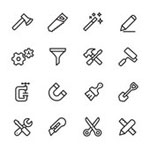
More Chalk Farm Tradespeople: Needless to say, when you happen to be doing home improvements in Chalk Farm, you'll probably need all types of different craftsmen and together with a coving installer in Chalk Farm, you could additionally need a flooring specialist in Chalk Farm, a general builder in Chalk Farm, a fire alarm installer in Chalk Farm, a plasterer in Chalk Farm, a tiler in Chalk Farm, SKIP HIRE in Chalk Farm, rubbish removal in Chalk Farm, wallpaper stripping services in Chalk Farm, a heating engineer in Chalk Farm, a locksmith in Chalk Farm, a carpenter/joiner in Chalk Farm, an electrician in Chalk Farm, plaster cornicing in Chalk Farm, and various other Chalk Farm tradesmen.
 Coving Installation Chalk Farm
Coving Installation Chalk Farm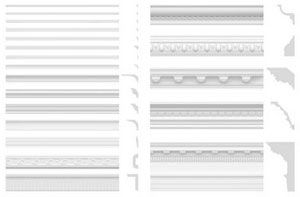 Coving Installers Near Chalk Farm
Coving Installers Near Chalk Farm Coving Fitters Chalk Farm
Coving Fitters Chalk FarmTo get local information on Chalk Farm, Greater London look here
More: Cornice Installation, Cheap Coving Fitters, Coving Services, Polyurethane Coving, Cornice Fitters, Cheap Coving Fitters, Coving Cutting, Gyproc Coving, Wooden Coving, Coving Installation, Lightweight Coving, Cornicing Services, Coving Cutting, Cheap Coving Fitters, Coving and Cornices, Coving Fitters, Gyproc Coving, Cornicing Services, Coving, Coving and Cornices, Polyurethane Coving, Cheap Coving, Coving Specialists, Coving Fitters, Coving Cutting, Cornices and Coving, Coving Installation, Coving Installers, Coving Installers, Cheap Coving, Coving Fitters, Lightweight Coving, Coving, Coving and Cornices, Lightweight Coving, Cheap Plasterers, Plaster Repairs, Plastering Repair, Plastering Services, Plaster Repair.
Coving fitters NW1 area, phone code 020.
TOP - Coving Installation Chalk Farm
Coving Installation Chalk Farm - Coving Fitters Chalk Farm - Ceiling Rose Installation Chalk Farm - Coving Fitters Near Me - Cornice Installation Chalk Farm - Cornices and Covings Chalk Farm - Coving Installers Chalk Farm - Dado Rails and Mouldings Chalk Farm - Coving Specialists Chalk Farm




